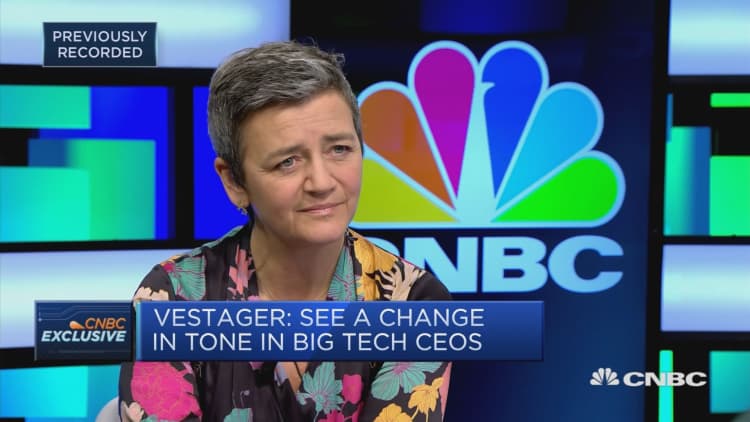The European Commission, the EU's executive arm, will likely look at new ways to deal with taxation following a landmark legal loss to Apple on Wednesday.
The EU's general court ruled the Commission failed to prove that the Irish government had given a tax advantage to the tech giant. This after the Commission ordered Apple to repay 13 billion euros ($14.9 billion) in unpaid taxes in 2016.
The European Commission could appeal Wednesday's decision within a two-month period.
The hotly-anticipated ruling was welcomed by Apple, but it doesn't prevent the Brussels institution from probing deals between governments and companies. It does, however, mean the EU needs to put forward more evidence in future — a potentially lengthy and complicated task.
"What is at stake is more than just the alleged aid granted to Apple. The judgement has consequences on the ability of the Commission to use state aid to rebalance tax regimes across Europe and also on its current plans to pursue low-tax member states which have advantageous corporate tax regimes," Paolo Palmigiano, head of U.K. competition, EU and trade practice at the law firm Taylor Wessing, told CNBC Wednesday.
The Commission has opened up different tax probes into major companies in recent years under its state aid rules. In 2015, for instance, it said that Fiat and Starbucks had received illegal tax benefits in Luxembourg and the Netherlands, respectively.

However, the EU's general court also ruled last year that the Commission did not prove that Starbucks paid less taxes as a result of the agreements with the Dutch government, also annulling the Commission's decision.
But the court did support the Commission's work into its investigation against Fiat, asking it to repay up to 30 million euros in back taxes.
Genevra Forwood, a partner at White & Case, told CNBC at the time that the Commission will likely put more effort into proving that the tax schemes by certain countries provided a clear advantage to the companies investigated.
In reaction to Wednesday's Apple ruling, Brussels said it "will continue to look at aggressive tax planning measures under EU State aid rules to assess whether they result in illegal State aid."
What are the alternatives?
According to Palmigiano, the Commission could look at taxation from the perspective that it's potentially creating distortion in the EU's single market, rather than whether it's illegal state aid.
"Under (article) 116, the Commission will need to issue a directive so it will lead to changes in the tax regimes of member states, which obviously will have an impact on companies, but this will not mean that companies will be investigated. The Commission will target certain national tax schemes that distort competition," he said.
Another possibility is by pushing for changes on how the European Union deals with taxation altogether.
The "Commission's attempt to reshape the international tax system by litigation has probably failed. They will now look elsewhere," Dan Neidle, a tax partner at Clifford Chance, told CNBC.
"The EU needs unanimity to legislate on tax. The Commission want to find a way round that. It is essentially looking for a loophole in a Treaty that clearly required unanimity on tax matters," he added.
At the moment, the EU needs the consensus of the 27 member states to amend or make new tax laws. This was one of the obstacles that prevented an EU-wide digital tax back in 2019 after four countries opposed the levy.
However, re-writing the EU's rulebook is a laborious and lengthy task.
"The Commission stands fully behind the objective that all companies should pay their fair share of tax. If Member States give certain multinational companies tax advantages not available to their rivals, this harms fair competition in the EU. It also deprives the public purse and citizens of funds for much needed investments — the need for which is even more acute during times of crisis," the European Commission said Wednesday.



